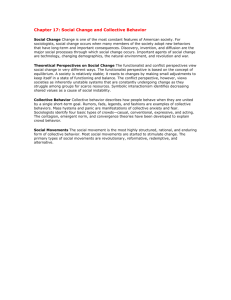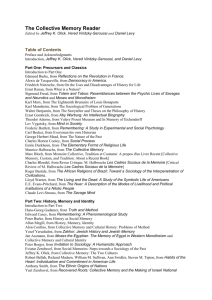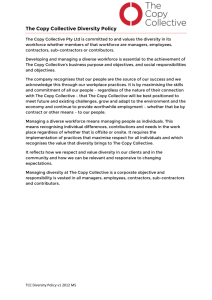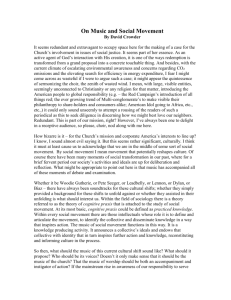TEST test - TL+Q Project
advertisement
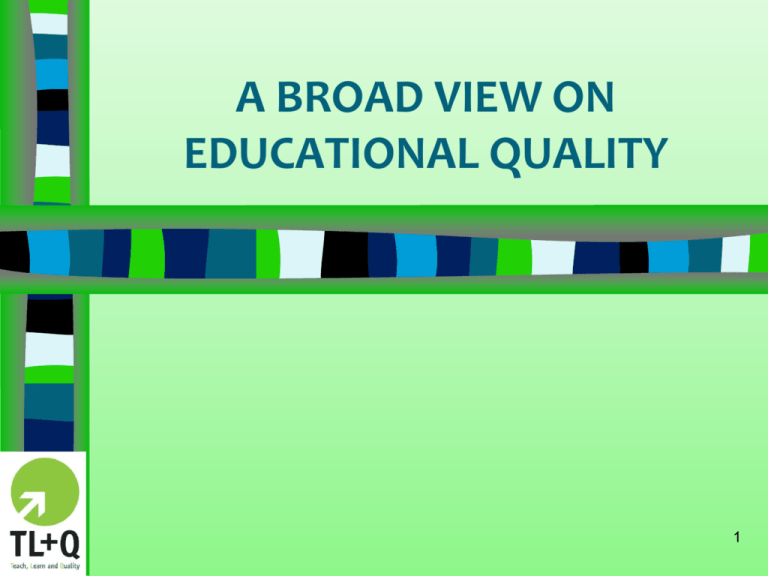
A BROAD VIEW ON EDUCATIONAL QUALITY 1 EXERCISE PRE-TASK 2: Read carefully next statements and give a score as you feel the current situation at your school, institution or organization is. Yes = No = Indeed, it is normal practice. We do so. Never heard about it. Impossible, not with us! I would like, but unfortunately... These statements are put on posters, hanging on the wall of the meeting room. Stick the flag of your region / country in the Yesor No-column 2 1 GENERAL SITUATION IN EUROPE 3 4 The development of quality assurance systems is an important lever for achieving improved educational quality and efficiency. Consequently, the quality of education is increasingly being evaluated across Europe. The focus of this evaluation may be the education system as a whole, or it may be individual schools or teachers. Moreover, European countries have adopted different and contrasting policies related to school accountability based on student performance. 5 MOST EUROPEAN COUNTRIES EVALUATE SCHOOL AND INDIVIDUAL TEACHERS 6 A MINORITY OF EUROPEAN COUNTRIES PUBLISH SCHOOL RESULTS IN NATIONAL TESTS 7 MORE AND MORE EUROPEAN COUNTRIES ROUTINELY PUBLISH THE RESULTS OF EXTERNAL SCHOOL EVALUATION 8 CONTINUING PROFESSIONAL DEVELOPMENT IS A PROFESSIONAL DUTY FOR TEACHERS IN THE MAJORITY OF EUROPEAN COUNTRIES 9 2 DEFINITIONS 10 What is quality? How to define quality? How define educational quality? 11 “All characteristics of an entity that bear on its ability to satisfy stated and implied needs”. ISO 8402 “The adequate realisation by the involved persons of their shared expectations”. Van Petegem and Vanhoof (University Antwerpen, Flanders Belgium) 12 ”School works with quality when, according to the established requirements, it adapts itself continuously to the educational needs of stakeholders and society”. Catalan Ministry of Education 13 ''Quality of education is the ability to accomplish, carefully selected targets, aimed at desirable yields of the educational process, meeting the needs of the organization and meeting the expectations of different actors .'' Hendriks and Wognum, Q5 Kwaliteitszorg Voortgezet Onderwijs 14 Quality Control Quality Assurance / Enhancement Quality Development Learning Organization 15 QUALITY CONTROL • Reactive. • Problems have already occurred and defects allowed into the product. • It’s about finding and fixing those problems. • You work with a number of inspectors checking the quality of the produced material. • Can you find all the problems that your production system allowed into the product? 16 QUALITY ASSURANCE / ENHANCEMENT • Proactive. • Try to foresee what problems there may occur or what may cause problems. • Try to prevent the problems. • You work with manuals and procedures that have a preventive focus. 17 QUALITY DEVELOPMENT • Proactive on an emancipatory way. • Motivate and strengthen your collaborators • Give them responsibility on the (educational) processes. • Working with people isn’t the same as working with machines or computers. • Results aren’t fully predictable; The Human Factor. • Quality development is a continuous process of gradual but constant improvement focussed on the development of the organization 18 towards a learning organization. LEARING ORGANIZATIONS • A learning organization is the term given to a company that facilitates the learning of its members and continuously transforms itself. •A learning organization has five main features: 1. 2. 3. 4. 5. Systems thinking Personal mastery Mental models Shared vision Team learning 19 EVALUATION OF QUALITY The key sources of evidence will come from: 1. what we actually observe, 2. from data of various sorts, 3. and from the views of people who are closely involved with the school, such as students, parents, partner agencies and staff. 20 PEOPLE’S VIEWS EVALUATION OF QUALITY QUANTITATIVE DATA DIRECT OBSERVATION 21 3 COMPETENCES 22 THE FREE DICTIONARY.COM The state or quality of being adequately or well qualified. A specific range of skill, knowledge, or ability. 23 BUSSINESS DICTIONARY A cluster of related abilities, commitments, knowledge, and skills that enable a person (or an organization) to act effectively in a job or situation. Because each level of responsibility has its own requirements, competence can occur in any period of a person's life or at any stage of his or her career. 24 QUALITY PROCEDURE MANUAL The capacity to apply (theoretical and practical) knowledge, skills and attitudes that are described in the learning outcomes of an educational programme in a concrete situation, at the end of an educational process. 25 VOLVO CARS 26 RESULT - VOLVO CARS STANDARDS PROCESSES METHODS FACILITIES 27 4 IMPACT OF ORGANIZATIONAL CULTURE 28 ORGANIZATIONAL CULTURE •Organizational culture refers to the taken for granted values, underlying assumptions, expectations, collective memories, and definitions present in an organization. •It reflects the prevailing ideology that people carry inside their heads. •It conveys a sense of identity to employees, provides unwritten rules and, often, unspoken guidelines for how to get along in the organization, and enhances the stability of the social system that they experience. (Cameron and Quinn, 1999). 29 Competing values Innovation Collective orientation Selfdetermination Human System control Individual specialization Tradition prof. dr. Dries Berings, HUB Brussel 30 Traditional school Innovation Collective Human System Individual Tradition 31 Team school Innovation Collective Human System Individual Tradition 32 Q-development school Innovation Collective Human System Individual Tradition 33 Innovation Collective Human Traditional school Q-development school System Individual Tradition 34 5 THE GENERAL APPROACH 35 THE FIVE QUALITY QUESTIONS Are we doing the right thing? (What) Are we doing things the right way? (How) How do we know this? What do others think about this? What do we do with all this knowledge? Movie The right thing? 36 THE APPROACH Cyclic: recurring, continuously Systematic: use a system Goal oriented: work towards set goals Integral: everbody participates, on ever aspect 37 6 SUMMARY 38 Working on educational quality Shouldn’t be Boring Just paper work Additional work A purely legal obligation Could be Challenging Exciting Meeting people Discovering new ideas Working on educational quality is being on the move! Working on educational quality is making a journey! 39 MOVIE ON THE MOVE 40

